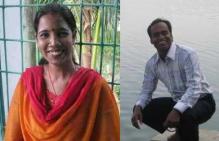 Every day, Asir Uddin, 30, crisscrosses the dirt roads and paddy-fields of Patnitala, a subdistrict of Naoga district in northwest Bangladesh, on his red motorcycle. As subdistrict coordinator for The Hunger Project (THP)-Bangladesh, Asir oversees the activities of animators, ward catalysts, women leaders and elected Union Parishad (UP) local government representatives at the grassroots level in the area. In fact, Asir is responsible for activities that are taking place in more than 300 rural villages, impacting the lives of over 200,000 people.
Every day, Asir Uddin, 30, crisscrosses the dirt roads and paddy-fields of Patnitala, a subdistrict of Naoga district in northwest Bangladesh, on his red motorcycle. As subdistrict coordinator for The Hunger Project (THP)-Bangladesh, Asir oversees the activities of animators, ward catalysts, women leaders and elected Union Parishad (UP) local government representatives at the grassroots level in the area. In fact, Asir is responsible for activities that are taking place in more than 300 rural villages, impacting the lives of over 200,000 people.
Asir first became involved with THP-Bangladesh when he was 22 years old. At the time, he was a college student in Rajshahi district and worked with his father, a farmer. After hearing about the opportunity from a local UP member, Asir participated in THP-Bangladesh’s 120th animator training. He was struck by the alternative, people-centered paradigm of development that THP presented. He decided that he must act, and became actively involved in Youth Ending Hunger (YEH), THP’s volunteer platform for youth in Bangladesh.
To achieve economic self-reliance, Asir began cultivating potatoes on land given to him by his father. Empowering others to take similar self-reliant action, Asir organized two animator trainings, and formed 11 units of YEH in Mougachi Union of Rajshahi district. Working with other animators, he arranged skills trainings in sewing for local women, and initiated awareness campaigns for better nutrition and sanitation, against dowry and early marriage, and against drug and alcohol abuse in his community.
After graduating from college, Asir’s engagement in bottom-up community development led him to work for the Village Education Resource Center, a national NGO, for over two years. At the same time, Asir remained involved as a THP volunteer, focusing on YEH activities. He took YEH’s message to schools and colleges, and worked to establish new YEH units and mobilize more social action campaigns.
When THP-Bangladesh formed a partnership with the HYSAWA Fund, a joint venture of the Danish and Bangladeshi Governments to increase hygiene, sanitation and clean water in rural areas, Asir was interviewed and selected to be the coordinator of Patnitala. Now, Asir coordinates HYSAWA activities with UP members, at the ward (village cluster) and community levels. He is helping to mobilize villagers in becoming organized, defining local priorities and taking action to achieve results. In the process, he is motivating a whole subdistrict to achieve 100 percent community-led sanitation by installing low-cost sanitary latrines and tube wells, testing for arsenic and transforming hygiene practices.
In Asir’s words: “After I took the animator training, I realized that only when people take responsibility will development be effective. Now I am seeing this happen all over Patnitala!”
In 2008, Asir met Hasina Khan, 24, known to everyone as “Hasi,” a name which means “smile” or “laughter.” Hasi was Ward Catalyst of ward number 11, Dibor Union, in Patnitala.
Hasi had first taken THP-Bangladesh’s animator training on August 25, 2008, with her father. She recalled how proud she felt that day, when, during the training, her father requested to the whole room of trainees that Hasi sing for them. What impacted Hasi the most during training was the material on gender and women’s empowerment. It made her think about the persistent discrimination against women, the way women are mistreated from birth, and the impact of early marriage.
Hasi explains her beliefs, “Women are behind, but they don’t have to be behind – they can do everything. There is no difference between men and women, boys and girls. We must give girls the same importance as boys.”
After taking part in the animator training, Hasi organized a community survey in her ward, and mobilized people to participate in a social mapping and well-being ranking project. She then took part in a capacity-building workshop that gave her tools to help her community achieve total sanitation. She was quickly designated Ward Catalyst, and is now responsible for a cluster of villages with a population of approximately 2,500. Among other things, she helps her community prepare sub-project proposals for the HYSAWA Fund – for the installation of tube wells, latrines, and hand pumps.
Hasi says that in her ward, lack of clean water and sanitation is the most pressing problem. The water layer is very low, below 200 feet, so all wells must be dug to reach that level. There are very few sanitary latrines and public defecation is common; leading to the pollution of water bodies and, consequently, water-borne disease. Education is scant, and illiteracy is high. Hasi’s ward also has a large tribal community who experience extreme deprivation – a result of landlessness, and lack of access to education. Hasi conducts workshops specifically with the tribal community, focusing on issues of sanitation and hygiene, to catalyze a transformation in their lives.
What drives Hasi? “I want a beautiful, green, healthy world.”
Brought together by a common commitment to the vision of a self-reliant Bangladesh, Hasi and Asir were married in 2009 and are expecting their first child. As THP-Bangladesh partners, they are dedicated to working with grassroots villagers and empowering them to become the agents of their own development. They support each other every day in this effort.
October 15, 2010
